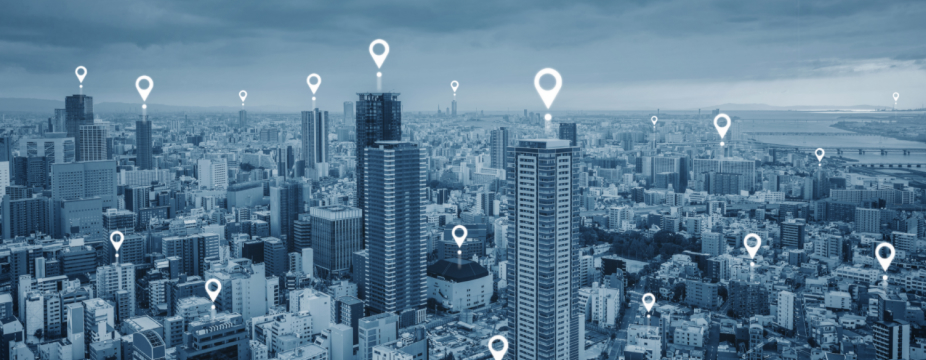|
Getting your Trinity Audio player ready...
|
Location intelligence is one of the recent technological advancements in the data and intelligence field. It is a method of driving insights from location data to answer spatial questions. The application of this technology goes beyond simple visualizations on maps. According to the Grand View Research report, the global location intelligence (LI) market size was valued at USD 10.6 billion in 2019. And it is expected to grow at a compound annual growth rate (CAGR) of 15.2%.
An increase in the number of portable navigation devices, web-mapping services, and smartphone applications is significantly contributing to the growth of LI technology. Predictive analytics, risk management, and real-time tracking of patterns and trends are a few benefits of location intelligence. Because of the increase in the number of LI applications that enhance personalized services, there is a rising demand for LI adoption to improve business processes. However, under-developed network infrastructure, data privacy concerns, lack of awareness, and other operational challenges affect the growth of LI.
Location Intelligence v/s Business Intelligence
Location intelligence and business intelligence are two distinctive technologies that operate under the same umbrella of AI and data science techniques. Business Intelligence is more concerned about where and what questions related to a business, whereas LI is all about answering the why behind those questions. For instance, business intelligence deals with what are the locations where sales increased consistently in the past quarter. Location intelligence is more about finding out why sales increased in these locations.
What are Location Intelligence Tools?
Location intelligence tools are often software-based dashboards that allow LI analysts and key decision-makers to visualize spatial data to drive delve insights. Analyzing, comparing, predicting, augmenting & interactive results are the practices of a location intelligence dashboard. Location Intelligence enables “mapping” capabilities, which is a lack in traditional analytical tools. Thus employing LI tools uncovers trends and business opportunities.
What Location Intelligence can do for You?
The wave of disruptive technologies upgraded the application of LI technology. Currently, location intelligence applications are being adopted all the way from selling products in a complex market environment to making intelligence-driven decisions in boardrooms. Below, we discussed a few use cases.
1. Customer analysis
Customer behavior analysis is a vital practice for an organization to drive sales and build a sustainable competitive advantage. Enabling location intelligence integrates customer data with demographic or lifestyle data to drive extra edge for a physical business to increase customer foot count. For instance, location data intelligence can build customer profiling, segmentation, and prospecting efforts to drive sales forecasting and increase store revenues.
2. Supply chain management
Unpredictable climate conditions, the occurrence of natural disasters, political upheavals, and more can affect inventory management and deliveries. Leveraging LI advantage helps companies in mitigating these challenges by building state-of-art strategies to run through complex supply chain architectures and develop necessary steps to be taken to reduce losses. Location-based applications can also help in improving transportation routing, distribution planning, and geo-fencing to track goods and vehicles that cross these virtual boundaries.
3. Retail site selection
Identifying a perfect location and establishing a brand in that location takes lots of time and research. LI tools help retailers find the best locations for a new store or for a chain of stores by quickly evaluating the local demographics, economic factors, and geographic data, and analyzing competitors’ data to analyze site sustainability. Further, the LI techniques can help retailers in drafting strategies to reach customers effectively and efficiently.
4. Geomarketing
Reaching targeted customers at the right time and place is a dream for any business to enhance its operations and build loyal customers. Geomarketing is advanced advertising and marketing technique that leverages insights provided by LI applications. And the advances in the Location Intelligence field are expanding in today’s smart mobile world. Business is using LI techniques to build tailor-made messages and campaigns to the target customer in particular locations at a defined time. IoT-enabled sensors, beacons, and intelligent communications are enacted as additional features to drive Geomarketing at an effective rate.
5. Field service planning & tracking
Businesses in utilities, telecom carriers, and oil & gas companies have extensive holdings and they employ thousands of technicians to repair and install a piece of equipment when a dispute arises. Location-based intelligent services withhold map services and customer locations for maintenance and service activities to reduce waiting time, decrease operational costs, and enhance customer satisfaction.
6. Smart cities
Smart cities are the future. Operations ranging from public services to security & surveillance utilize the applications of LI. With the increasing usage of smart devices, it is becoming easy for governments, businesses, and people to operate effectively from distant locations. It is said that 80% of data available today has a location component and analyzing it can unlock a variety of location intelligence use cases for developing futuristic solutions.
If you aren’t already, you should think about adding location intelligence to your business landscape, because your competition is likely to take advantage – Steve Benner.
To know how soulpage can enable your business in leveraging location-based business data to extract meaningful insights and develop powerful solutions for effective operations, consult our solution experts.
Talk to our experts
